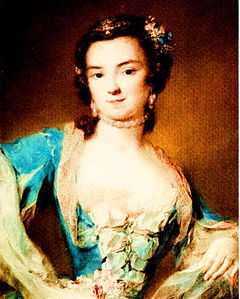Barbara Campanini

Barbara Campanini, known as La Barberina, (7 June 1721 - 7 June 1799) was a famous Italian ballerina, one of the most important ballet dancers of the 18th century.
Barbara Campanini was born in Parma. She became a student of Antonio Rinaldi Fossano, with whom she gave her debut at the Paris Opera in 1739, which became an immediate success. After a tour in London she performed in Vienna before she returned to Paris in 1743. She was noted by the young Prussian king Frederick the Great, who offered her a position at the newly erected Court Opera in Berlin, where she performed from 1744 onwards. Before she arrived, however, she had eloped her contract to Venice with her lover Lord Stuart Mackenzie, and King Frederick used political pressure arresting a Venetian envoy to have her turned over to Prussia. Jean-Jacques Rousseau who was a secretary at the French ambassy at that time, was involved with her case.
In Berlin, she had a privileged position, demonstrated by the fact that she negotiated her own annual salary of 7,000 Reichsthaler, which was unusually high. There were speculations that she had an affair with King Frederick (though reputed as misogynic), as well as many other persons. She broke her contract suddenly by accepting a proposal by Carl Ludwig von Cocceji, son of the Prussian chancellor Samuel von Cocceji, onstage in 1749, causing a veritable scandal. Her fiancé went to prison, Campanini herself once again eloped to London, but returned to Berlin and secretly married Cocceji. Her spouse was finally pardoned by the king and appointed district governor at Glogau in Silesia, where the couple lived until they were divorced in 1788. In 1789, she was given the title Gräfin (Countess) Campanini. During her last years, she was active within charity.
Barbara Campanini died on her 78th birthday at her country estate in Barschau near Lüben, Silesia. She donated her money by will to a foundation for poor noblewomen, which lasted until World War I.
Sources
![]() Media related to Barbara Campanini at Wikimedia Commons
Media related to Barbara Campanini at Wikimedia Commons
- This article incorporates information from the equivalent article on the German Wikipedia.
| ||||||||||||||||||||||||||||
|
